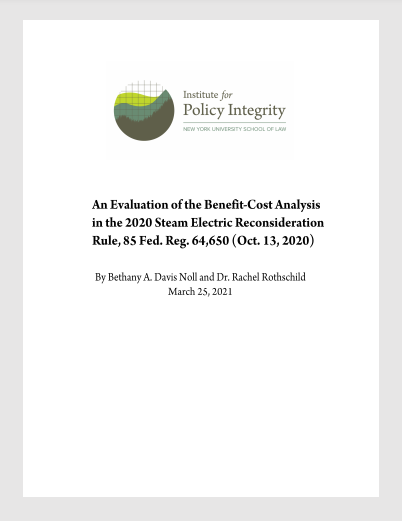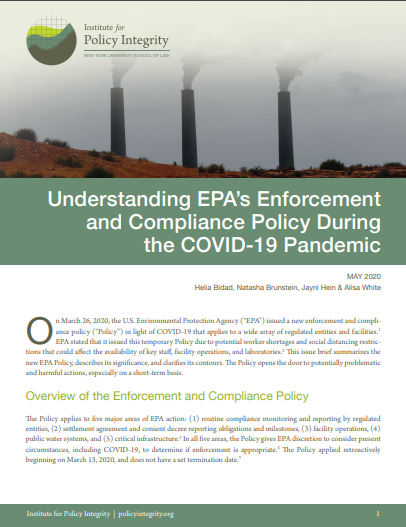-
An Evaluation of the Benefit-Cost Analysis in the 2020 Steam Electric Reconsideration Rule
85 Fed. Reg. 64,650 (Oct. 13, 2020)
In its analysis of the 2020 Steam Electric Reconsideration Rule, the Environmental Protection Agency failed to adequately provide quantitative estimates for numerous harms from steam electric power plants' wastewater streams and drew conclusions about the rule’s impacts that are undermined by a fair assessment of unquantified impacts. Our report identifies flaws in the 2020 Rule and details changes the agency can make to significantly improve its benefit-cost analysis.
-
Amicus Brief on the SAFE Rule
We filed an amicus brief explaining how NHTSA and EPA's decision to finalize a rule that, even under their own analysis, will be net-costly to society, is arbitrary and capricious.
-
Amicus Briefs on Navigable Waters Protection Rule
In April, the Environmental Protection Agency (EPA) and Army Corps of Engineers published the Navigable Waters Protection Rule, which considerably restricts the waters and wetlands that are federally protected under the Clean Water Act. We filed briefs in the Northern District of California and District of South Carolina focusing on the agencies’ economic analysis, which the agencies use to obscure the rule’s anticipated harms. We later filed in the Tenth Circuit Court of Appeals, the Northern District of New York, the District of Massachusetts, and the District of Maryland.
-
Comments to EPA on Cross-State Air Pollution Rule
Our comments on the Revised Cross-State Air Pollution Rule Update for the 2008 Ozone NAAQS identify critical flaws in the proposal's design and regulatory impact analysis. The Environmental Protection Agency's (EPA) unreasonably low valuation of climate effects also contributes to its selection of an inefficient policy alternative. We submitted joint comments detailing how EPA's flawed analysis harms public health and the environment.
-
Presidential Transition Guidance
As the presidential transition begins, the Institute for Policy Integrity has outlined recommended policy priorities for the Biden administration on climate, energy, and environmental policy, and related social equity outcomes. It is crucial that the incoming administration undertake aggressive reforms that are grounded in science and economics. In recent months, we published a series of reports highlighting actionable, near- and medium-term policy recommendations in several key areas.
-
Comments to FWS on Critical Habitat Designations
The Fish and Wildlife Service (FWS) proposed amendments to its regulations for designating critical habitat. Several of FWS’s changes are inconsistent with the best practices for weighing the costs and benefits of agency action. We submitted comments explaining how the proposal is flawed in multiple ways and should not be finalized.
-
Comments to EPA on Proposed Dust-Lead Pollution Rules
The Environmental Protection Agency (EPA) proposed revisions to dust-lead post-abatement clearance levels. We submitted comments emphasizing how EPA, itself, concedes that the economic analysis supporting the rule is inaccurate.
-
Comments to EPA on Proposal for Cost-Benefit Analysis and the Clean Air Act
We submitted joint comments to EPA and the chartered Science Advisory Board noting that the proposal is unnecessary and explaining how it breaks from best practices for cost-benefit analysis of regulations in several significant ways.
-
Comments to EPA on Delay of Emissions Rule for Wood Heaters
The Environmental Protection Agency (EPA) is proposing to amend the 2015 New Source Performance Standards (NSPS) for residential wood heating devices, purporting to respond to retailer needs in the wake of the COVID-19 pandemic. Our comments detail how how the proposal contradicts the Clean Air Act’s mandate and longstanding agency guidance. The proposed rule will, even under the agencies’ own analysis, cause net harms to the public without providing any reasonable justification.
-
Understanding EPA’s Enforcement and Compliance Policy During the COVID-19 Pandemic
This issue brief summarizes EPA's enforcement and compliance policy in light of COVID-19, describing its significance and clarifying its contours. The policy opens the door to potentially problematic and harmful actions, especially on a short-term basis.
Viewing recent projects in Environmental Health








